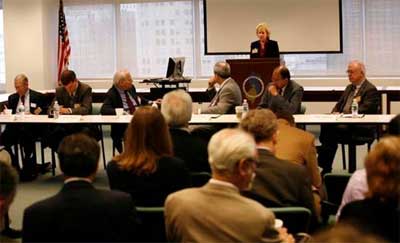News & Information
Please select a year.
NJTPA Symposium Focuses on Nation's Transportation Funding Crisis
A panel of state and national experts discussed the critical need for elected officials and the public to find common ground on transportation financing during a symposium held June 25 at the North Jersey Transportation Planning Authority in Newark. The symposium, "Financing Our Transportation System: Options and Actions," examined the nation's near- and long-term infrastructure needs, funding shortfalls, and potential options for closing the gaps.
NJTPA Chairman Susan M. Zellman, a Sussex County Freeholder, said the symposium was timely, as Congress is now preparing a new authorization of the nation's transportation funding law, which expires on Sept. 30.
"Many of the details are still being worked out, but we do know that change is in store," Zellman said. "There will be greater accountability requirements, stronger linkages between transportation investments and expected policy outcomes, and much greater emphasis on energy-efficiency and reducing carbon emissions."
Attended by almost 100 people, the event was moderated by Martin E. Robins, Senior Fellow at the Rutgers University Voorhees Transportation Center, who called transportation financing "the most serious challenge policymakers face today."

NJTPA Chairman Susan M. Zellman addressing attendees at the symposium.
Keynote speaker Richard T. Hammer, the Assistant Commissioner for Capital Program Management at the New Jersey Department of Transportation (NJDOT), described the challenge of maintaining the state's vast network of roads and bridges. Among the critical looming funding needs, he said, is the need to repair or replace major bridges, some costing hundreds of millions of dollars.
Yet Hammer also highlighted the NJDOT's successful efforts to streamline design costs so the agency has more money to spend on construction. "We are getting to a point now ... where we're spending less than 10 cents on the dollar for design and 90 cents on the dollar going toward construction," Hammer said. "That's up from roughly 75 cents on the dollar just 10 years ago."
Emil Frankel, Director of Transportation Policy at the Washington, D.C.-based National Transportation Policy Project, said transportation funds must go toward targeted investments that will yield the greatest economic social and environmental benefits. Among the benefits worth pursuing, he said, was lessening the nation's dependence on petroleum, which he deemed a "national security risk." This would require more investments in transit and greater transportation efficiency, he said.
Funding systems must be reformed to ensure spending is driven strictly by national goals rather than politics, according to panelist Steven Van Beek, the President and CEO of the Eno Transportation Foundation, Washington, D.C. Van Beek said this is "the most fluid time the transportation sector has experienced in decades," an environment where important issues that were ignored in the past are now being vigorously debated.
But if far-reaching reforms are to be enacted, they will need a strong public outreach and education effort behind them, said panelist Ferrol Robinson, Research Fellow at the Hubert Humphrey Institute of Public Affairs at the University of Minnesota. He said that was the key to the success of a number of alternative funding measures, such as congestion pricing and HOT lanes, that were adopted in cities around the world. One innovative approach, he said, was a congestion pricing plan implemented for a seven-month trial period in Stockholm before the public voted on it in a referendum.
The final speaker, New Jersey Alliance for Action President Philip Beachem, said the bi-partisan effort in 1984 that spearheaded the creation of the New Jersey Transportation Trust Fund can serve as a model for addressing today's state transportation financing crisis. Beachem said few in the public today truly understand the depth of the problem. But he said solving the state financing shortfall "was doable" if officials recaptured the bipartisan spirit of the past and built upon the recent success in financing of the new Hudson River rail tunnel.

